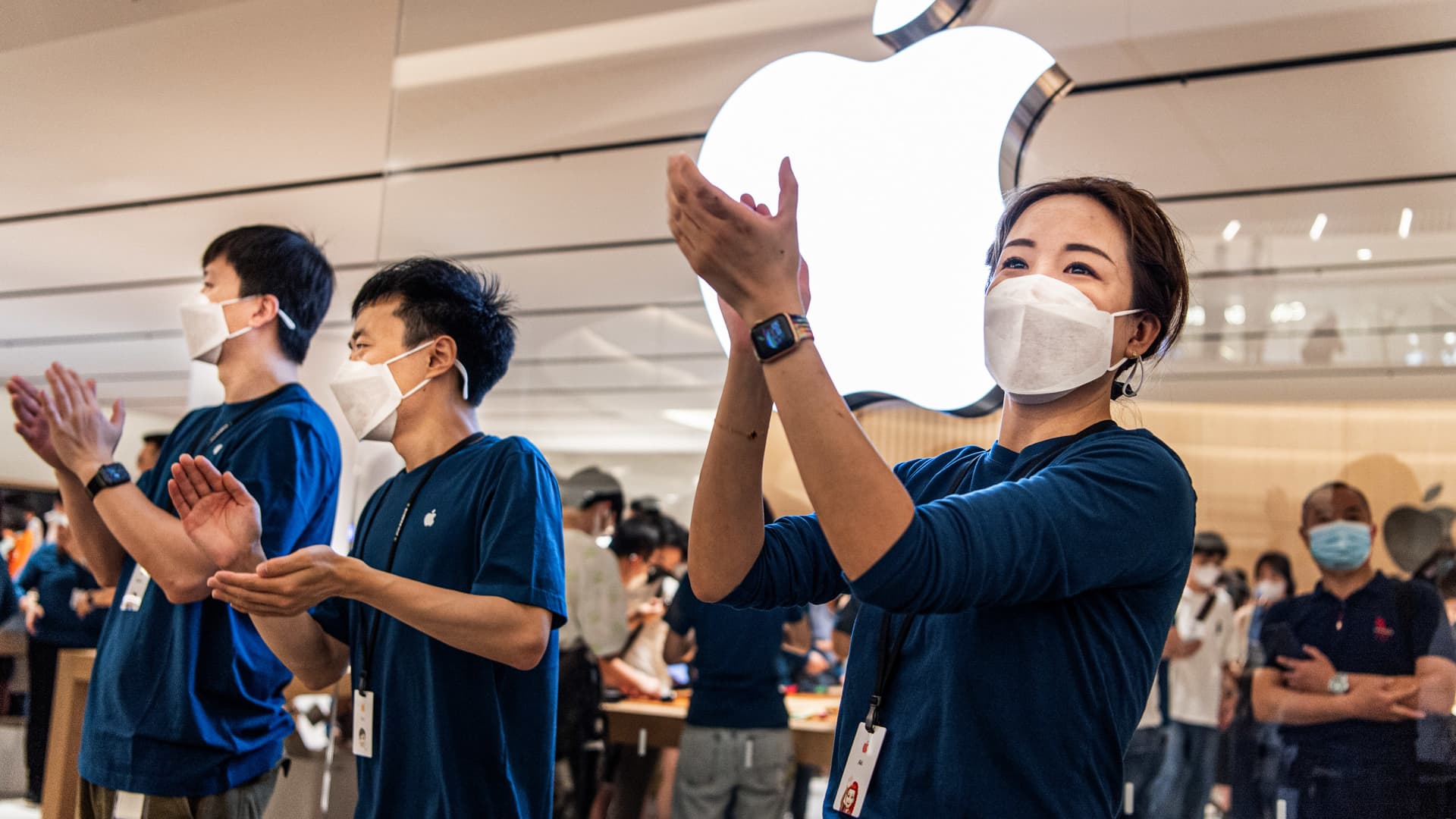
Apple reported fiscal third-quarter earnings on Thursday that beat Wall Street expectations for sales and profit but showed slowing growth for the iPhone maker.
Apple stock rose over 3% in extended trading.
Here are the key numbers compared to what Wall Street was expecting, per Refinitiv estimates:
- EPS: $1.20 vs. $1.16 estimated, down 8% year-over-year
- Revenue: $83 billion vs. $82.81 billion estimated, up 2% year-over-year
- iPhone revenue: $40.67 billion vs. $38.33 billion estimated, up 3% year-over-year
- Services revenue: $19.60 billion vs. $19.70 billion estimated, up 12% year-over-year
- Other Products revenue: $8.08 billion vs. $8.86 billion estimated, down 8% year-over-year
- Mac revenue: $7.38 billion vs. $8.70 billion estimated, down 10% year-over-year
- iPad revenue: $7.22 billion vs. $6.94 billion estimated, down 2% year-over-year
- Gross margin: 43.26% vs. 42.61% estimated
Apple did not provide formal guidance for the quarter. Analysts expected the company to give fourth-quarter guidance of $1.31 in earnings per share and nearly $90 billion in sales.
“In terms of an outlook in the aggregate, we expect revenue to accelerate in the September quarter despite seeing some pockets of softness,” Apple CEO Tim Cook told CNBC’s Steve Kovach.
Apple’s revenue rose 2% during the quarter, compared to 36% growth during the same period last year and over 8% growth in the March quarter. Cook said the results were better than expected and CFO Luca Maestri said it was a “challenging operating environment.”
Chipmakers and other computer vendors have signaled that there is slowing demand for smartphones and PCs around the world as consumers grapple with recession fears and decades-high inflation. Apple’s soft growth may suggest that the consumer electronics industry — including leaders like Apple — is headed for a period of slow or no growth.
Cook told CNBC that the company is seeing inflation but will continue to make investments.
“We do see inflation in our cost structure,” Cook said. “We see it in things like logistics and wages and certain silicon components and we’re still hiring, but we’re doing it on a deliberate basis.”
Apple’s iPhone sales exceeded Wall Street expectations, suggesting that demand for iPhone 13 models remains strong even in the second half of the product’s annual release cycle. Apple typically releases new iPhones in September and sales fall as customers anticipate new models.
Cook said Apple had success attracting Android customers to become iPhone owners during the quarter.
“We had a record level of switchers and saw double digit growth for customers new to iPhone,” Cook said.
The Services business was the fastest growing segment for Apple during the quarter. It includes monthly subscriptions, payment fees, warranties, search licensing fees from Google, and revenue from the iPhone App Store.
Services grew over 12% during the quarter, although that is a decline from the 17% growth it posted in the second quarter, and down from the 27% growth it reported during the same time period last year.
Cook said Apple has 860 million current paid subscriptions, which includes anyone who subscribes to an app sold on the Apple App Store in addition to products such as Apple Music and iCloud.
Mac sales were short of consensus expectations and fell over 10% on a year-over-year basis. Cook said this was due to supply constraints and the strong dollar.
In April, Apple warned that parts shortages would hit revenue by between $4 billion and $8 billion, and Apple’s website showed extended shipping times for many Mac models during the quarter. Cook said the ultimate hit came in under $4 billion.
Apple also announced new MacBook Air models during June that did not start shipping to customers until July. MacBook Air is Apple’s best-selling computer.
Apple’s iPad declined 2% annually, but beat soft Wall Street forecasts, as iPad tablets were one of the product lines analysts believed that Apple might prioritize away from in the face of a chip shortage. Cook said that the iPad decline was also driven by supply constraints and a strong dollar.
Apple’s other products category, which includes headphones like AirPods, Apple Watches, and HomePod speakers declined over 8% on an annual basis and missed Wall Street expectations.
Apple’s business in Greater China, which includes Taiwan and Hong Kong, declined 1% on an annual basis to $14.6 billion. Cook said that result was despite major Covid restrictions that hurt demand.
Apple’s gross margin exceeded the company’s own forecast from April. Apple reported 43.26% in gross margin, over the 42% to 43% range the company suggested earlier this year.
Apple said it spent over $28 billion on share buybacks and dividends during the quarter.






